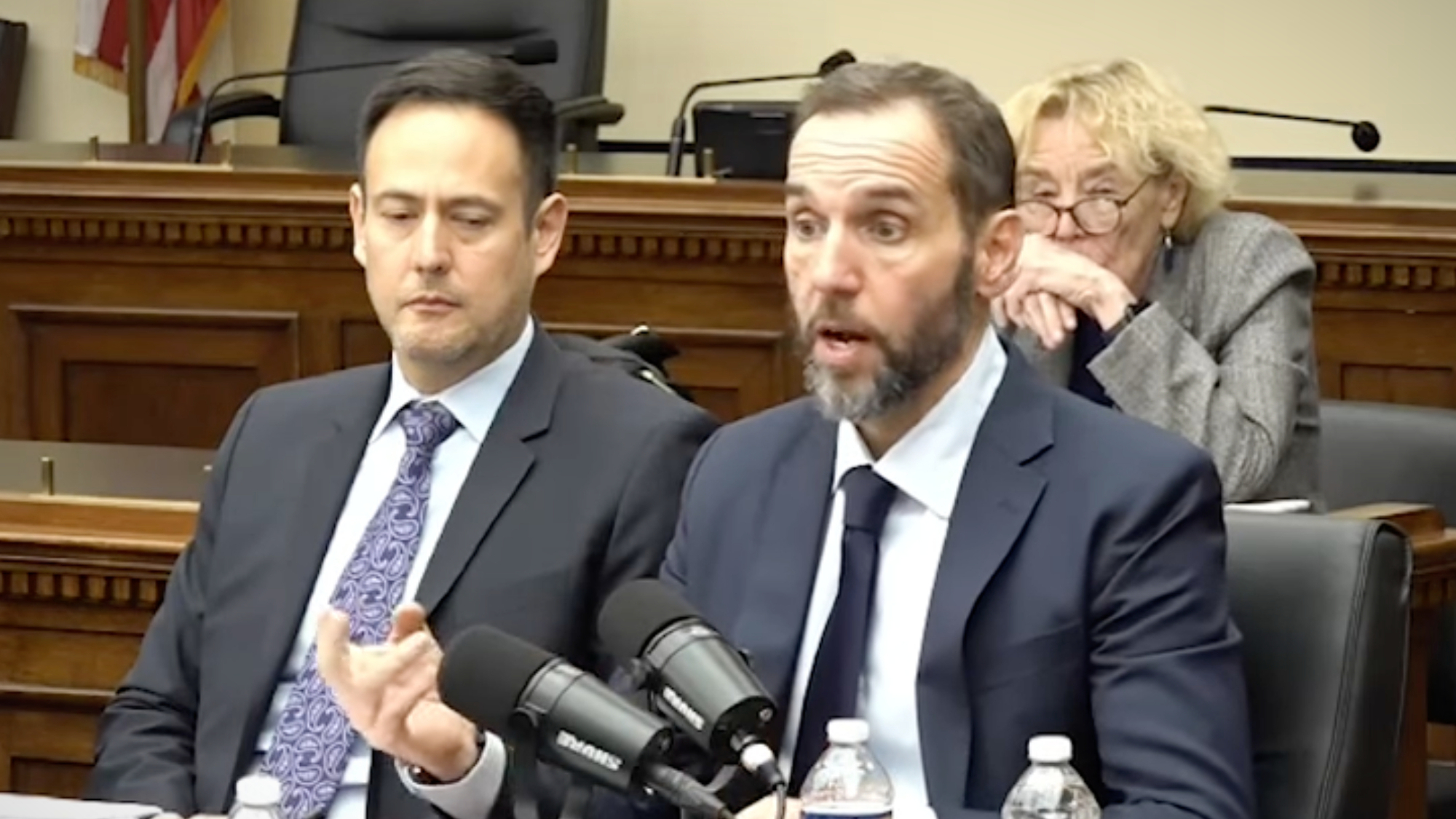The historical precedents for George Santos' possible expulsion
Why Santos' indictment is a thorny issue for congressional Republicans who, in other circumstances, would be quick to expel him


A free daily email with the biggest news stories of the day – and the best features from TheWeek.com
You are now subscribed
Your newsletter sign-up was successful
Democrats have backed a push to expel Rep. George Santos (R-N.Y.) from the House of Representatives. Santos, a first-term congressman, had his voluminous fabrications about his personal and professional life exposed shortly after his election in November 2022. Earlier this month, Santos was indicted for 13 separate offenses, including fraud, campaign finance violations, and a scheme to defraud the federal government of COVID unemployment relief funds in 2020. Santos has combatively insisted on his innocence. Can he survive the scandal? Here's how similar events have gone down in history.
How do expulsions work?
While the architects of the Constitution famously did not fully anticipate the way that political parties would shape our politics, they nevertheless imposed prohibitive supermajority requirements for congressional expulsions. The dangers of partisan expulsion have been on full display this year in Tennessee, where Republicans used their legislative supermajorities to expel two representatives from Nashville and Memphis from the state House on spurious grounds. And because parties have almost never enjoyed two-thirds majorities in either chamber, expulsions have been very rare.
The vast majority of expulsions from the U.S. Congress took place between 1861 and 1862, when the House expelled three and the Senate expelled 14 members from states that had joined the Confederacy and who had effectively vacated their seats. There have been only two expulsions in either chamber since the Civil War: Rep. Michael Myers (D-Pa.) in 1980 for accepting bribes during the FBI's so-called ABSCAM sting operation, and Rep. Jim Traficant (D-Ohio) in 2002 after accusations of corruption and bribery.
The Week
Escape your echo chamber. Get the facts behind the news, plus analysis from multiple perspectives.

Sign up for The Week's Free Newsletters
From our morning news briefing to a weekly Good News Newsletter, get the best of The Week delivered directly to your inbox.
From our morning news briefing to a weekly Good News Newsletter, get the best of The Week delivered directly to your inbox.
Other members of Congress accused of serious wrongdoing have either resigned ahead of potential expulsion, like Rep. Bob Ney (R-Ohio), or weathered the storm until they were either exonerated or subject to lesser discipline, like the "severe admonishment" that the Senate Ethics Committee handed down to Sen. Robert Torricelli (D-N.J.) in 2002, or the "reprimand" given to Rep. David Schweikert (R-Ariz.) in 2020 for campaign finance abuses. Torricelli later resigned anyway, fearing that the scandal would cost Democrats his Senate seat. Others have even survived unsuccessful indictments, including Sen. Bob Menendez (D-N.J.). Members have almost always resigned after convictions if they had not already done so.
Will Santos get tossed?
On May 16, Rep. Robert Garcia (D-Calif.) introduced a "privileged" motion to expel Santos, a rarely-used maneuver that forced a vote on the matter within two days. "Republicans now have a chance to demonstrate to Americans that an admitted criminal should not serve in the House of Representatives," Garcia said in a press conference after introducing the motion. House Republicans voted instead to refer Santos' conduct to the House Ethics Committee, which opened a probe into the congressman's conduct. 204 Democrats voted against the referral to the Ethics Committee, meaning the party was largely united in its effort to expel Santos from the chamber immediately. But behind closed doors, senior Democrats expressed unease with the strategy, fearing the precedent it would set to expel a member on a party-line vote before investigations are completed.
There are two main factors working against the Democrats' plan to expel Santos prior to federal legal proceedings or the House Ethics Committee's investigation. The first is that the GOP holds an extremely narrow majority in the House, and despite the overwhelming evidence of misconduct against Santos, is unlikely to jettison a member of their caucus until greater pressure builds to do so. The very narrowness of their majority is another reason that House Speaker Kevin McCarthy (R-Calif.) and his allies are likely to give Santos more time. Republicans currently hold a 222-213 majority in the chamber, meaning they have just four votes to spare on many pieces of legislation. And for McCarthy, losing Santos could mean losing his job as Speaker — Santos was one of his backers on the final roll call vote for Speaker in January, a tally McCarthy won by just one vote.
If Santos is convicted, however, even Republicans fearful for their agenda would likely vote to expel him, even though it would possibly mean losing the seat to Democrats. McCarthy has said that even though he doesn't support expulsion now, he would support a move against the freshman congressman if he is convicted in court or found to have violated the law by the House Ethics Committee. Santos' seat, New York's third congressional district, voted for President Biden by more than 8 points, and even before the scandals, it was going to be a top Democratic pickup target in 2024. With Democrats dramatically overperforming in special elections so far this cycle, they would have a very good chance of capturing the seat.
A free daily email with the biggest news stories of the day – and the best features from TheWeek.com
A nuisance for the GOP
Many Republicans, though, seem to regard Santos as such a nuisance, and the producer of enough bad publicity, that they would be happy to see him gone even if it narrowed the party's room for maneuvering in the House. Fellow New York Rep. Mike Lawler called Santos' behavior "embarrassing and disgraceful," and added that "he should resign." But because there is no law preventing him from doing so, Santos may very well continue to serve unless and until he is convicted in a court of law, which might not happen until next year. If he refuses to resign after a conviction (there is also no rule requiring him to do so), it could fall to House Republicans to join with their counterparts to expel him.
David Faris is a professor of political science at Roosevelt University and the author of "It's Time to Fight Dirty: How Democrats Can Build a Lasting Majority in American Politics." He's a frequent contributor to Newsweek and Slate, and his work has appeared in The Washington Post, The New Republic and The Nation, among others.
-
 How the FCC’s ‘equal time’ rule works
How the FCC’s ‘equal time’ rule worksIn the Spotlight The law is at the heart of the Colbert-CBS conflict
-
 What is the endgame in the DHS shutdown?
What is the endgame in the DHS shutdown?Today’s Big Question Democrats want to rein in ICE’s immigration crackdown
-
 ‘Poor time management isn’t just an inconvenience’
‘Poor time management isn’t just an inconvenience’Instant Opinion Opinion, comment and editorials of the day
-
 House ends brief shutdown, tees up ICE showdown
House ends brief shutdown, tees up ICE showdownSpeed Read Numerous Democrats joined most Republicans in voting yes
-
 Democrats win House race, flip Texas Senate seat
Democrats win House race, flip Texas Senate seatSpeed Read Christian Menefee won the special election for an open House seat in the Houston area
-
 House approves ACA credits in rebuke to GOP leaders
House approves ACA credits in rebuke to GOP leadersSpeed Read Seventeen GOP lawmakers joined all Democrats in the vote
-
 Jack Smith: Trump ‘caused’ Jan. 6 riot
Jack Smith: Trump ‘caused’ Jan. 6 riotSpeed Read
-
 Can Mike Johnson keep his job?
Can Mike Johnson keep his job?Today's Big Question GOP women come after the House leader
-
 Congress passes bill to force release of Epstein files
Congress passes bill to force release of Epstein filesSpeed Read The Justice Department will release all files from its Jeffrey Epstein sex-trafficking investigation
-
 What happens to a Democratic Party without Nancy Pelosi?
What happens to a Democratic Party without Nancy Pelosi?TODAY'S BIG QUESTION The storied former speaker of the House is set to retire, leaving congressional Democrats a complicated legacy and an uncertain future
-
 Is Mike Johnson rendering the House ‘irrelevant’?
Is Mike Johnson rendering the House ‘irrelevant’?Talking Points Speaker has put the House on indefinite hiatus
